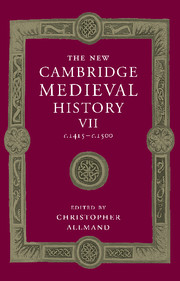Book contents
- Frontmatter
- PART I GOVERNMENT
- PART II ECONOMIC AND SOCIAL DEVELOPMENTS
- PART III SPIRITUAL, CULTURAL AND ARTISTIC LIFE
- 10 Religious Belief and Practice
- 11 Schools and Universities
- 12 Humanism
- 13 Manuscripts and Books
- 14 The Beginning of Printing
- 15 Architecture and Painting
- 16 Music
- PART IV THE DEVELOPMENT OF EUROPEAN STATES
- Appendix Genealogical Tables
- Primary Sources and Secondary Works Arranged by Chapter
- Index
- Frontispiece
- Plate section
- Map 1 European towns in the late Middle Ages
- Map 2 European commerce and trade
- Map 4 Winds and currents facilitating the discoveries
- Map 5 The universities o f Europe in 1400 and 1500
- Map 6 Germany and the Empire
- Map 20 The Roman Orthodox and Ottoman worlds in the fifteenth century
- References
11 - Schools and Universities
from PART III - SPIRITUAL, CULTURAL AND ARTISTIC LIFE
Published online by Cambridge University Press: 28 March 2008
- Frontmatter
- PART I GOVERNMENT
- PART II ECONOMIC AND SOCIAL DEVELOPMENTS
- PART III SPIRITUAL, CULTURAL AND ARTISTIC LIFE
- 10 Religious Belief and Practice
- 11 Schools and Universities
- 12 Humanism
- 13 Manuscripts and Books
- 14 The Beginning of Printing
- 15 Architecture and Painting
- 16 Music
- PART IV THE DEVELOPMENT OF EUROPEAN STATES
- Appendix Genealogical Tables
- Primary Sources and Secondary Works Arranged by Chapter
- Index
- Frontispiece
- Plate section
- Map 1 European towns in the late Middle Ages
- Map 2 European commerce and trade
- Map 4 Winds and currents facilitating the discoveries
- Map 5 The universities o f Europe in 1400 and 1500
- Map 6 Germany and the Empire
- Map 20 The Roman Orthodox and Ottoman worlds in the fifteenth century
- References
Summary
at least until the crisis of the Great Schism, the salient features in the history of schools and universities of medieval Christendom were progress and, on the whole, continuity. By contrast, the advent of the fifteenth century ushered in an era of change. There was still progress, certainly: new foundations, a continually expanding body of teaching masters and students, a social demand that was increasingly vigorous. At the same time, however, institutions were being transformed and becoming secularised; traditional autonomy was in rapid retreat before new state pressures; the curriculum itself became the focus of unprecedented criticism, both implied and outspoken. This chapter, then, will be devoted essentially to a consideration of the old and the new, of tradition and innovation.
growth and change in the scholastic and vniversity systems
Naturally, these systems continued to be based in large measure on structures inherited from the thirteenth and fourteenth centuries. By about 1400, in the case of universities, there existed around thirty functioning studia generalia endowed withimperial and papal privileges which clearly defined their status. Of these studia generalia only three ceased to exist during the course of the century. The rest varied greatly in importance: the oldest (Bologna, Paris, Oxford, Salamanca) remained the most prestigious, the only ones capable of becoming luminaries on the international stage and of attracting really significant numbers of students – it has been calculated that by about 1450 there were likely to have been almost 2,000 students at Oxford, with twice as many in Paris.
Keywords
- Type
- Chapter
- Information
- The New Cambridge Medieval History , pp. 220 - 242Publisher: Cambridge University PressPrint publication year: 1998



